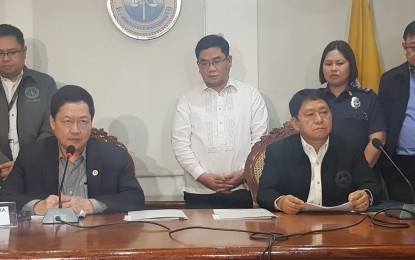
MANILA -- A definitive manual for the smooth implementation of the controversial provisions of Republic Act No. 10592 or expanding the Good Conduct Time Allowance for prisoners is being completed by the Department of Justice (DOJ) and the Department of the Interior and Local Government (DILG).
"This will handle the nitty-gritty details of the law," Justice Secretary Menardo Guevarra announced Monday afternoon after the signing ceremony for the revised Implementing Rules and Regulations (IRR) with Interior Secretary Eduardo Año.
Guevarra noted that even as the IRR and the manual is nearing completion it may be both superseded by legislation amending the GCTA law.
The manual, being drafted along with the revised IRR, seeks to fine-tune the details of the law. Among other things, the IRR now clearly excludes recidivists, escapees, habitual delinquents, and convicts of heinous crimes from being eligible for the GCTA.
The IRR also defined heinous crimes based on jurisprudence and as enumerated in Republic Act No. 7659, which imposed death penalty on certain heinous crimes such as murder, rape, destructive arson, parricide, kidnapping and serious illegal detention, and drug-related offenses.
Guevarra explained that while disqualified under the 2013 GCTA law, they are still covered by the good conduct time allowance with minimal time under the Revised Penal Code.
“They earned time credits under the Revised Penal Code, they keep that and will continue to earn that. However, what will they not earn is additional time credit because of the GCTA law,” he said.
The revised IRR will also require the online posting of a list of prisoners entitled to said credits and allowances and the participation of the DOJ in deliberations.
Guevarra explained that a more thoroughly vetted list of who is actually entitled to the GCTA among the initial batch of 1916 persons deprived of liberty (PDLs) earlier said to have been released is being prepared.
The justice chief reiterated those who were released erroneously under the expanded GCTA should heed President Rodrigo Duterte’s order for them to return to jail until September 19 or face a manhunt.
“After Sept. 19 and they (PDLs) refuse (to surrender), we have already taken this position since under the law and under the existing jurisprudence you have not completed the service of your sentence and it is your duty to serve it to the fullest,” Guevarra said.
“We gave you notice, we gave you a grace period of 15 days (yet) you refused without justifiable reason then in effect you are committing the offense of evasion of sentence,” he added.
Guevarra said the names with photos of those who would fail to report back for re-computation of their GCTA will be made public
The revision of the IRR of Republic Act 10592 stemmed from the controversy surrounding the supposed release of former Calauan Mayor Antonio Sanchez, who was convicted of rape and murder in 1995 for the killing of two University of the Philippines students, Eileen Sarmenta and Allan Gomez, in 1993.
Año, meanwhile, said the issuance of a new IRR seeks a fairer and more just implementation of the law.
"We want to implement it consistent with the intent and spirit of the law. Thus, we have clarified all ambiguous provisions that we think led to past abuse in its implementation,” Año said.
“The new IRR also firmed up and expanded the definition of ‘Good Conduct’ by not limiting it to conspicuous and satisfactory good behavior but also defining it as ‘non-commission of any crime or offense during the period of imprisonment,’” he added.
The new definition immediately disqualifies those who commit crimes and other infractions while inside the prison from the coverage of the said law.
The DILG Chief also said that another new feature of the IRR is that the list of PDLs qualified for release, based on presumptive entitlement to time credits and allowances shall be posted in three conspicuous places within the prison or jail facility as well as posted in their respective websites before they are released.
“This is for greater transparency,” he said.
As provided for in the GCTA Law, the new IRR provides that 20 days may be deducted from detention or service sentence during the first two years of imprisonment; a deduction of 23 days during the third to fifth year; twenty-five days during the following years until the tenth year; and 30 days during the eleventh year and onwards.
“But instead of granting the time allowances on a monthly basis, the new IRR now provides that the granting of credits will depend on the time of incarceration of the PDL and will be on a cumulative basis so that the general conduct of the PDL will be taken into account and not just his monthly behavior,” he explained.
He explained that while the assessment of good conduct will be done on a monthly basis, the accrued time allowances shall now be granted by prison and jail authorities at the: a) first two years of imprisonment; b) fifth year of his imprisonment; c) 10th year of his imprisonment; d) 11th year of his imprisonment and every year thereafter.
The new IRR also recognizes the existing Management, Screening and Evaluation Committee (MSEC) in each prison or jail facility.
The 2019 Revised Implementing Rules and Regulations of Republic Act No. 10592, which amends the Revised Penal Code or RA 3815, aims to help in the reformation and rehabilitation of PDLs while upholding justice and retribution.
According to Año, 612 have already surrendered to the PNP and BuCor as of Monday
"The President gave them a grace period of 15 days to turn themselves in and if they do not, then the PNP will arrest them," said Año. (with reports from Lloyd Caliwan/PNA)
